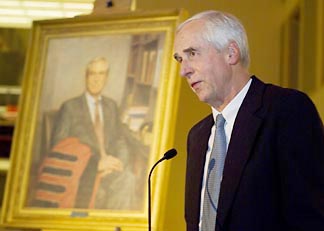The former president of Cornell, who now serves as interim president, claims that this is a religious argument, and that it has no place in science classes. He devoted no less to this than his annual speech to the university's trustees and said that this is a serious threat to science

The interim president of Cornell University, Hunter Rawlings, said on Friday that he condemns the attempt to teach the theory of creation as science, calling it "religious belief masquerading as a secular idea."
"The theory of intelligent design is not a valid scientific theory," Rawlings said in a speech to about 700 university trustees and senior officials at the annual meeting of Cornell's board of directors. "It does not have the ability to develop new knowledge through testing hypotheses, adjusting the original theory to the results of experiments and conducting repeated tests through more refined experiments that provide more insights." Rawlings said.
Rawlings, who served as Cornell's president from 1995-2003, is now serving as interim president in light of the sudden departure of previous president Jeffrey Layman.
The theory of intelligent design holds that life is too complex to develop through evolution, and it requires the intervention of an intelligent being. The theory was criticized by the National Academy of Sciences in the USA. The American Association for the Advancement of Science calls this theory "creationism in a new package" and believes that its teaching should not be included in science classes.
These demands of intelligent design supporters have resulted in a large number of schools in 20 US states being asked to teach this theory in states such as California, New Mexico, Kansas and Pennsylvania. President Bush exacerbated the conflict in August when he said schools should teach creationism alongside evolution.
According to Rawlings, a large minority in the US, 40 percent, wants creationism to be taught in schools instead of evolution, but knowing that it will not be possible to pass such a decision, they compromise on studying at the same time.
For these reasons, Rawlings felt that he must use his annual State of the University speech - usually dedicated to the institution's progress compared to the previous year - to speak out against the theory of intelligent design that puts reason under attack.
Rawlings commented that this is not the first time that evolution has been attacked. Similar struggles took place in the sixties of the 19th century, immediately after Charles Darwin published his book "The Origin of Species by Natural Selection," and in the 20s of the 1987th century, the "Monkey Trial" was held in which a high school biology teacher was accused, Van Scopes, in the teaching of evolution. Evolution made headlines again in XNUMX when the US Supreme Court ruled that Louisiana's creationism ordinance was invalid.
Rawlings' comments are not the first in which Cornell has stood at the forefront of the fight to protect science. Cornell's first president, Andrew Dixon White, wrote a two-volume book, "The History of the Interplay of Science and Theology in Christianity," in which he attempted to provide his readers with a clear distinction between theology and science."
However, Rawlings also said that Cornell has a history of supporting religious freedom. The campus is home to 26 different religious groups and it even plans the dietary options according to the different religious requirements (of course without coercion). Rawlings said that it is necessary to discuss the theory of creation but in the right context. "We will not suspend and certainly will not eliminate the role of science to allow any idea to penetrate the American education system. Intelligent planning is a subjective concept, and at its core, a religious belief." said.
